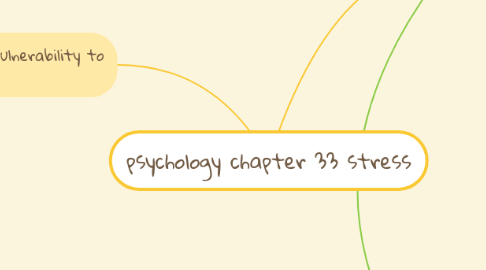
1. stress and vulnerability to disease
1.1. behavioral medicine
1.1.1. Health psychology
1.1.1.1. study of how stress and healthy and unhealthy behaviors influence health and illness.
1.1.1.2. psychoneuroimmunology
1.1.1.2.1. mind-body interactions and the immune system
1.1.1.2.2. immune system
2. immune system err
2.1. respond too strongly
2.1.1. attack body's own tissue
2.1.2. allergic reactions
2.2. underreacting
2.2.1. allow bacterial infection to flare
2.2.2. dormant virus erupt
3. stress= weaker immune system
3.1. stressed people are more vulnerable to colds
3.2. surgical wounds heal more slowly in stressed people
3.3. vaccine effectiveness declines with stress
4. stress+disease
4.1. stress and Aids
4.1.1. stress weakens immune system which allows the HIV virus to change into AIDS faster.
4.2. stress and Cancer
4.2.1. ability to get cancer increases with stress
4.2.1.1. not all studies found that link
4.2.1.2. psychotherapy does not extend cancer patients' survival
4.3. stress and heart disease
4.3.1. stress
4.3.1.1. can predict heart attack risk
4.3.1.2. increase blood vessel inflammation
4.3.2. personality
4.3.2.1. type A personality
4.3.2.1.1. toxic core is negative emotions
4.3.2.2. type B personality
4.3.2.2.1. mellow laidback fellows with no heart disease
4.3.2.3. Type D personality
4.3.2.3.1. supress negative emotion
4.3.3. pessimism and depression
4.3.3.1. pessimists 2x more likely to develop CHD
4.3.3.2. people with broad smiles
4.3.3.2.1. extensive social networks
4.3.3.2.2. longer life
4.3.3.3. depression
4.3.3.3.1. twice as likely to die with a bad mood
5. leading cause of death in america at 610,000 deaths per year
6. forgiveness releases anger and calms the body
7. The stress response system
7.1. stress hormones: epinephrine and norepinephrine
7.1.1. increase heart rate
7.1.2. increase respiration
7.1.3. diverts blood from digestion to skeletal muscles
7.1.4. dulls feelings of pain
7.1.5. releases sugar and fat from the body's stores.
7.2. general adaptation syndrome
7.2.1. body adapts to stress unconditionally
7.2.2. phase 1: alarm reaction
7.2.2.1. sympathetic nervous system suddenly activates
7.2.3. phase 2: resistance
7.2.3.1. summon all reasources to meet the challenge
7.2.4. phase: 3: exhaustion
7.2.4.1. vulnerable to illness, or collapse and die
8. acculturative stress
8.1. stress from adaptation to new culture
9. stress: some basic concepts
9.1. stress
9.1.1. The process of relating threat to self
9.2. stressor
9.2.1. threat or challenges
9.2.2. daily hassles and social stress
9.2.2.1. spotty phone connections, aggravating housemates
9.2.3. significant life changes
9.2.3.1. leaving home, divorce, losing job, death of loved one.
9.2.4. catastrophies
9.2.4.1. unpredictable large scale events
9.2.4.2. earthquakes, floods, wildfires, storms
9.3. stress reaction
9.3.1. physical and emotional response to stress
10. tend and befriend stress response
10.1. to give and seek support stress response
11. withdraw
12. Catharsis
12.1. the idea that "releasing" aggressive energy (through action or fantasy) relieves aggressive urges
12.1.1. you feel better but it doesn't lower aggression
